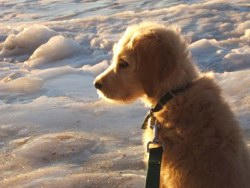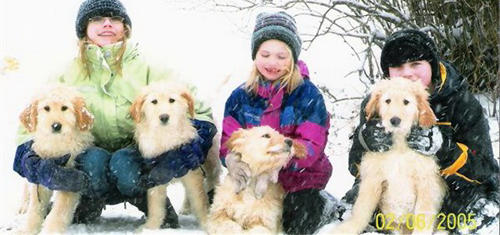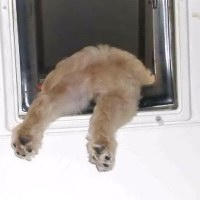
© Copyright Goldendoodles.com 2001. All rights reserved. You may not copy or otherwise use anything on this site without our written permission.
Made with Xara
.


Goldendoodles.com
Choosing a Breeder
A breeder has told you that the pups parents are AKC registered
and they come from a line of champions. If you assume that
this ensures they are healthy - you'd be wrong.
Animals living in the wild have natural selection working to
shape their breed - survival of the fittest. If a wolf's hips aren't
fit enough to help him outrun preditors, he will die and his seed
will be lost. For thousands of years men have been breeding
descendants of these wolves, and in doing so creating different
types of dogs. These new breeds served functions; guard dogs, retrieving dogs, hunting dogs. Again,
there was a selection, this time by man, in breeding only those dogs who served best. This ensured
that the dogs carrying the most desired genes were the ones passing them on to the next generation.
Recently, most dogs in North America have been bred as family pets. As breeding dogs aren't run like
working dogs, there's often no visible signs of inherited problems. The selection process has switched
from functionality to physical appearance. But we live in the modern scientific age, and we have
access to medical science to help us select the fittest dogs from which to choose to breed.
Goldendoodles and Labradoodles come from several parent breeds and each has it's own health
risks. Hybrid vigour will increase the general health of the Dood pup, but it can only work with what it
is given. Some of these health risks are moderately prevalent, and some appear only rarely.
Golden Retrievers: Hips, elbows, eyes and heart
Labrador Retrievers: Hip, elbows, eyes and skin allergies
Standard Poodles: Hips, eyes and Sebaceaous Adenitis, vWD
Miniature Poodles: Progressive Retinal Atrophy (PRA) DNA Test, eyes,
hips, vWD
Toy Poodles: PRA, eyes, Patellar Luxation, vWD
Some breeders also screen for thyroid problems, and do other blood panels for general health
screening. eg: a CBC, complete blood count, which shows a severe problem, but not necessarily a
specific disease. For more information on suggested health tests for breeding dogs - click here.
As owners and future owners, we can have a great impact on the world of dog breeding by choosing
breeders who we feel are breeding responsibly.
What to look for in a breeder:
• Well being
A good breeder will provide for both the emotional and
physical well-being of the parent dogs and pups in their
kennel. Their kennel or home should appear clean. Their dogs
and pups will be regularly visited by a Vet, and up to date on all
innoculations.
• Testing
A good breeder cares about the future of their breeds, and tests their parent dogs for genetic
diseases. There are several genetic diseases inherent to Retrievers and Poodle. Hip Dysplasia (HD) is
the most prevalent, and all breeders listed on this site MUST test their breeding dogs for HD. Some
breeders also test for- Sebaceous Adenitis (SA), elbow laxity, CERF (eye test), vWD, thyroid, liver, heart.
Each breeder runs a kennel by their own standards - ask questions.
To understand more about why it is important to test for genetic diseases in breeding dogs - we've
started to put together some informational pages. The first is an article written by Gary F. Mason
entitled Eliminating Genetic Diseases in Dogs: A Buyer's Perspective.
For more information on Hip Dysplasia, and what to look for - read this article
Hip Dysplasia - A Mini Tuturial for the Puppy Buyer by Jan
For more information on CERF (Canine Eye Registration Foundation) - read this article
CERF Testing
• Integrity
A good breeder should be honest and up front. They should be able to answer your questions
knowledgeably and be candid about their kennel and the dogs they breed. They will have a
reputation for dealing with problems professionally, and honouring their contracts. They stand on
their own merit without vilifying or condemning others publically. They will encourage you to seek
feedback from every source, not just the ones they provide.
• Health warranty
A good warranty is a pre-existing agreement between an owner and a breeder that should
state clearly what is covered and how restitution should be made. When things go wrong and
emotions run high, it's important for each party to know what to do, what to expect - and to
have already agreed upon it as fair.
A good breeder will have a comprehensive health warranty that will cover, at the very least, two years
(which is long enough to know if a pup has problems). These warranties should not be contingent
upon returning your dog for a refund - no one should have to return a pup. Most will cover
expenses up to the cost of the pup, once Vet records or radiologist's report have been provided.
Ask if your refund comes with stipulations. Some breeders will only refund if you agree never to
discuss it on an open forum. This 'mum clause' serves to hides the problems this breeder has had,
and is likely to have in the future.
When buying, if you are not comfortable with everything about the breeder and the puppy, then
DON'T BUY IT.
• Reading a Breeder's Website
"The breeder's website says their breeding dogs are health tested, hips tested, and there is a two year
health warranty. That's perfect, right?
Well... maybe not.
"Okay - so what exactly is 'health tested and hip-tested'."
Good question. There is actually a huge range of interpretation in this statement.
Hip-tested can mean anything from certification by a PennHIP certified canine radiologist to a once-
over by the local Vet. Ask questions.
Life Threatening Genetic defects often doesn't cover HD, the most prevalent problem in large breed
dogs. It's crippling, not life threatening. Ask questions.
Covering HD - can refer to covering only the most crippling and severe cases - OR - - to covering all
levels of HD; mild, moderate and severe. All require treatment of some sort. Ask questions.
Replacement pup - Do you have to return the first pup? Some breeders offer a second pup, others
expect the sick pup to be returned. As many people would not want to part with their beloved pet,
some owners of problem pups never get back to the breeder about the problem. Valuable feedback
is lost to the breeder, and the same breeding dogs can be used again. Ask questions.
Contingencies Read your warranty through very carefully. Are there any food or exercise
restrictions? Are there contingencies which void or alter the warranty in certain situations? Make
sure you are comfortable with the warranty BEFORE signing or sending in the deposit. A responsible
breeder will provide a reasonable warranty, one in which both the owner and the breeder are
protected.
Let's also look at red flags:
• deposits are generally in the neighbourhood of a few
hundred dollars. Those asking lots more often make their
money by keeping unreturned deposits (once the client
realizes there is a problem and tries to back out.)
• Some contracts state that:
You must pay for the puppy in full well before the delivery date and
all money received is non-refundable no matter what the circumstances!! BEWARE!
• Beware of kennels who purchase dot com names of other kennels to
redirect traffic to their site! How many dogs are they pumping out?
• Is the registry owned by the kennel?
• Does the site emphasise fees/penalties/early payment?
• It is a good idea to ask to see at least one of the parents of your pup. It is common for breeders to
own only one parent for a litter produced, but when no parents are available, it can be an indication
that the litter was produced in a puppy mill situation.
• Speak to other owners who have visited their premises to pick up their pups. If owners have been
met at local gas stations and crossroads to pick up their pup, could the breeder be hiding something?









The information contained on this site is in no way intended to replace that of proper veterinary advice, diagnosis or treatment.
It is meant to provide resource, so that we can better understand canine health related issues.


© Copyright Goldendoodles.com 2001. All rights reserved. You may not
copy or otherwise use anything on this site without our written permission
Made with Xara
.
Choosing a Breeder
A breeder has told you that the pups parents are AKC registered and they come from a line of champions. If you assume that this ensures they are healthy - you'd be wrong. Animals living in the wild have natural selection working to shape their breed - survival of the fittest. If a wolf's hips aren't fit enough to help him outrun preditors, he will die and his seed will be lost. For thousands of years men have been breeding descendants of these wolves, and in doing so creating different types of dogs. These new breeds served functions; guard dogs, retrieving dogs, hunting dogs. Again, there was a selection, this time by man, in breeding only those dogs who served best. This ensured that the dogs carrying the most desired genes were the ones passing them on to the next generation. Recently, most dogs in North America have been bred as family pets. As breeding dogs aren't run like working dogs, there's often no visible signs of inherited problems. The selection process has switched from functionality to physical appearance. But we live in the modern scientific age, and we have access to medical science to help us select the fittest dogs from which to choose to breed. Goldendoodles and Labradoodles come from several parent breeds and each has it's own health risks. Hybrid vigour will increase the general health of the Dood pup, but it can only work with what it is given. Some of these health risks are moderately prevalent, and some appear only rarely. Golden Retrievers: Hips, elbows, eyes and heart Labrador Retrievers: Hip, elbows, eyes and skin allergies Standard Poodles: Hips, eyes and Sebaceaous Adenitis, vWD Miniature Poodles: Progressive Retinal Atrophy (PRA) DNA Test, eyes, hips, vWD Toy Poodles: PRA, eyes, Patellar Luxation, vWD Some breeders also screen for thyroid problems, and do other blood panels for general health screening. eg: a CBC, complete blood count, which shows a severe problem, but not necessarily a specific disease. For more information on suggested health tests for breeding dogs - click here. As owners and future owners, we can have a great impact on the world of dog breeding by choosing breeders who we feel are breeding responsibly. What to look for in a breeder: • Well being A good breeder will provide for both the emotional and physical well-being of the parent dogs and pups in their kennel. Their kennel or home should appear clean. Their dogs and pups will be regularly visited by a Vet, and up to date on all innoculations. • Testing A good breeder cares about the future of their breeds, and tests their parent dogs for genetic diseases. There are several genetic diseases inherent to Retrievers and Poodle. Hip Dysplasia (HD) is the most prevalent, and all breeders listed on this site MUST test their breeding dogs for HD. Some breeders also test for- Sebaceous Adenitis (SA), elbow laxity, CERF (eye test), vWD, thyroid, liver, heart. Each breeder runs a kennel by their own standards - ask questions. To understand more about why it is important to test for genetic diseases in breeding dogs - we've started to put together some informational pages. The first is an article written by Gary F. Mason entitled Eliminating Genetic Diseases in Dogs: A Buyer's Perspective. For more information on Hip Dysplasia, and what to look for - read this article Hip Dysplasia - A Mini Tuturial for the Puppy Buyer by Jan For more information on CERF (Canine Eye Registration Foundation) - read this article CERF Testing • Integrity A good breeder should be honest and up front. They should be able to answer your questions knowledgeably and be candid about their kennel and the dogs they breed. They will have a reputation for dealing with problems professionally, and honouring their contracts. They stand on their own merit without vilifying or condemning others publically. They will encourage you to seek feedback from every source, not just the ones they provide. • Health warranty A good warranty is a pre-existing agreement between an owner and a breeder that should state clearly what is covered and how restitution should be made. When things go wrong and emotions run high, it's important for each party to know what to do, what to expect - and to have already agreed upon it as fair. A good breeder will have a comprehensive health warranty that will cover, at the very least, two years (which is long enough to know if a pup has problems). These warranties should not be contingent upon returning your dog for a refund - no one should have to return a pup. Most will cover expenses up to the cost of the pup, once Vet records or radiologist's report have been provided. Ask if your refund comes with stipulations. Some breeders will only refund if you agree never to discuss it on an open forum. This 'mum clause' serves to hides the problems this breeder has had, and is likely to have in the future. When buying, if you are not comfortable with everything about the breeder and the puppy, then DON'T BUY IT. • Reading a Breeder's Website "The breeder's website says their breeding dogs are health tested, hips tested, and there is a two year health warranty. That's perfect, right? Well... maybe not. "Okay - so what exactly is 'health tested and hip-tested'." Good question. There is actually a huge range of interpretation in this statement. Hip-tested can mean anything from certification by a PennHIP certified canine radiologist to a once-over by the local Vet. Ask questions. Life Threatening Genetic defects often doesn't cover HD, the most prevalent problem in large breed dogs. It's crippling, not life threatening. Ask questions. Covering HD - can refer to covering only the most crippling and severe cases - OR - - to covering all levels of HD; mild, moderate and severe. All require treatment of some sort. Ask questions. Replacement pup - Do you have to return the first pup? Some breeders offer a second pup, others expect the sick pup to be returned. As many people would not want to part with their beloved pet, some owners of problem pups never get back to the breeder about the problem. Valuable feedback is lost to the breeder, and the same breeding dogs can be used again. Ask questions. Contingencies Read your warranty through very carefully. Are there any food or exercise restrictions? Are there contingencies which void or alter the warranty in certain situations? Make sure you are comfortable with the warranty BEFORE signing or sending in the deposit. A responsible breeder will provide a reasonable warranty, one in which both the owner and the breeder are protected. Let's also look at red flags - • deposits are generally in the neighbourhood of a few hundred dollars. Those asking lots more often make their money by keeping unreturned deposits (once the client realizes there is a problem and tries to back out.) • Some contracts state that: You must pay for the puppy in full well before the delivery date and all money received is non-refundable no matter what the circumstances!! BEWARE! • Beware of kennels who purchase dot com names of other kennels to redirect traffic to their site! How many dogs are they pumping out? • Is the registry owned by the kennel? • Does the site emphasise fees/penalties/early payment? • It is a good idea to ask to see at least one of the parents of your pup. It is common for breeders to own only one parent for a litter produced, but when no parents are available, it ican be an indication that the litter was produced in a puppy mill situation. • Speak to other owners who have visited their premises to pick up their pups. If owners have been met at local gas stations and crossroads to pick up their pup, could the breeder be hiding something?







The information contained on this site is in no way intended to
replace that of proper veterinary advice, diagnosis or treatment.
It is meant to provide resource, so that we can better understand
canine health related issues.




